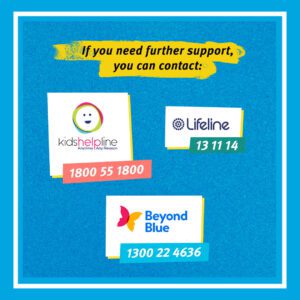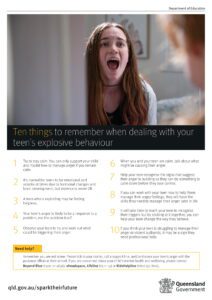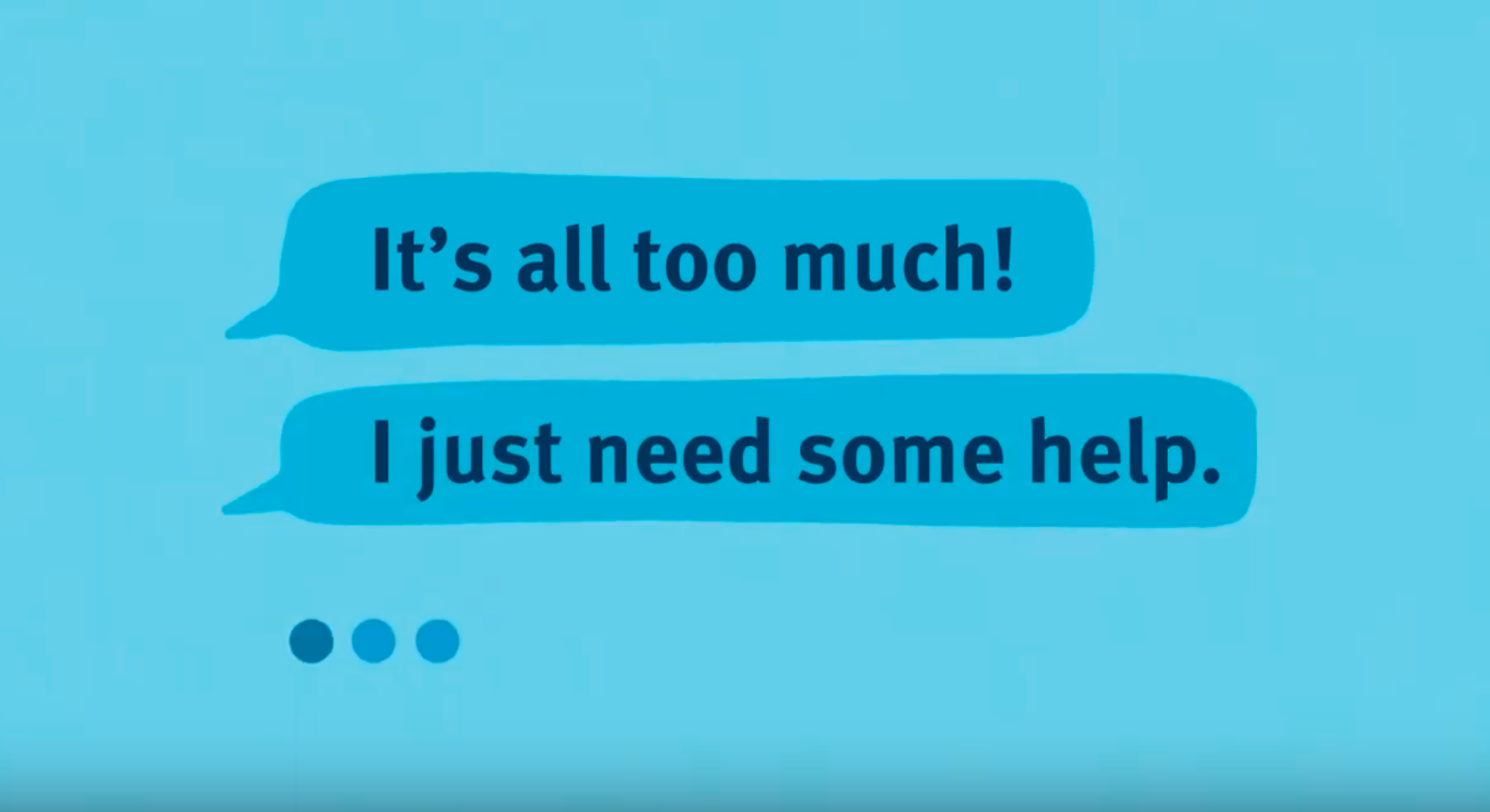Key Points
- Keep calm. If you feel your anxiety or anger rising, withdraw and call someone for help. You can only support your child and model how to manage anger if you are in a calm headspace.
- It’s normal for teens to be emotional and volatile at times due to hormonal changes and brain development.
- See your teen’s anger as a response to a problem, not the problem itself.
- Pick a time when you and your team are calm to help your teen understand and deal with the problem that is causing their anger.
- Teach your teen about the signs to look out for that suggest their anger is building and help them work out what might be triggering their anger.
- Work with your teen to help them manage their angry feelings so they will be able to manage these feelings later in life.
- If you think your teen is struggling to manage their anger or violent outbursts, it may be a sign they need professional help. Talk to your doctor or call a support line on our resources page.
When your teen explodes, it is really hard for them and also for you. But there are things you can do to help your teen deal with their anger. When you can focus more on the underlying reason for your teen’s behaviour, and less on the behaviour itself, you’ll be better able to manage your own response and remain calm so you can help your child.
First, make sure your child and people around you are safe
If your teen is angry and behaving in a violent way that could harm themselves, other people, or property, please ensure they are safe and seek professional advice.

Why changing how you view your teen’s behaviour can help
When your teen is being disruptive and even destructive, it’s easy to lose your cool and become angry. Finding ways to stop yourself from reacting this way is essential if you want to help your teen deal with their behaviour. Changing the way you view your teen’s behaviour can help you manage your own response. It can really help to remember that a teen who is exploding is feeling helpless and needs your support. And when you can see your child’s anger as a response to a problem, not the problem itself, it can help you manage your own feelings so you can support your teen in dealing with what is causing their anger.
If you struggle to stay calm, or if you’re upset by your child’s anger, help is available. Please visit our resources page for a list of support lines you can call.
Understand what’s going on in your teen’s brain
The teenage years are a time of many changes in their brains. These changes affect the way teens respond to stress. When our brain responds to stress, it’s the primitive part of our brain that reacts and triggers our fight-or-flight response. It does this because it feels under threat. When your teen lashes out and behaves in a destructive or even violent way, it’s because their brain’s stress response can leave them fleeing or flighting at the slightest provocation and can even blunt their awareness of pain, hunger, thirst along with their capacity to show emotional awareness and empathy.
Remember that a teen who is exploding is feeling helpless
Instead of seeing a child who needs to be controlled, try and remember that a teen who is exploding is feeling helpless. When your teen lashes out, their brain is responding to what they see as a threat, and they are unlikely to listen to anything you are saying and may not even know what they are saying. In these moments, difficult as they are, your focus needs to be on calming your child. The best way to do this is in the way you respond.
Be calm, not controlling
When your teen is experiencing this stress response, trying to respond to them in a controlling way generally only tips them further into ‘fight or flight’. So raising your voice, issuing commands and warnings, and giving out punishments are unlikely to work. Instead, try to:
- lower your tone of voice
- slow down your speech
- relax your facial expression, gestures and posture
- picture your child as your friend’s child – it can help give you the emotional distance you need to stay calm
- let your teen go somewhere to cool off, in your home or garden
- avoid following your teen and asking for apologies or an explanation while they are still angry, but tell them where you will be and check-in with them
- find a time to talk later when you are both feeling calm and receptive.
Looking for the reason
Explosive behaviour does not come out of nowhere. When your teen lashes out, it helps to remember that there is a reason your teen is behaving like this. One of the biggest ways you can make a difference is by trying to work out what that reason is. Often that reason will be due to stress associated with feeling disconnected, useless, powerless, or out of control. And there will usually have been signs of excess stress earlier that might be a clue to what might have triggered your child.
Talking about their anger
When your teen is feeling calm, use these tips to talk to them about what is going on for them. Be calm and supportive and show your understanding by speaking to their emotional brain and saying things like, ‘I can see you were very angry – it must have been awful to feel so upset’ or ‘I’m really sorry you are going through this, it must be so hard’. Gently ask them questions, encouraging them to look for the reason for their anger, and then listen and let them talk. Use questions like:
- ‘What were you feeling before you got angry?’
- ‘Were you feeling hurt about something before you got angry?’
- ‘Were you thinking about something that made you feel angry?’
- ‘Did something happen today that made you feel angry?’
- ‘Can you help me understand how you’re feeling? What made you feel angry?’
Helping them to recognise when their anger is building
One way you can help your teen to deal with their anger is to teach them the signs to look out for that suggest their anger is building. Some of the physical signs they could experience include stomach clenching, feeling tense, clenching teeth, feeling flushed, brain racing, rapid breathing, cold hands, and holding their breath. Some teens might also start to pace before exploding with anger. Talk to your teen about ways they can defuse their anger before it gets out of control, including:
- doing some exercise
- hitting a punch bag or a pillow
- listening, dancing, or playing along to music
- writing about their feelings
- talking to a trusted adult.
Looking for their triggers
Learning what triggers your teen’s anger is an important step in helping them manage their own behaviour. Every teen is different and will have different triggers. By observing your teen, you may be able to identify what triggers your child.
- Watch and listen when your child is hanging out with friends, doing their homework or playing sport and notice if there are any patterns that suggest a particular interaction is triggering anger in your teen.
- Talk to trusted adults who know your child and ask them to keep an eye out for situations where your teen’s anger is triggered.
- Talk to your teen’s teacher to see if they’ve observed any situations that seem to cause your teen to become stressed and then angry.
- After your teen has had an angry outburst, and when they are calm and ready to talk, ask them, ‘What happened before you blew up today?’ and see if, together, you can work out what might have triggered them.
It takes time
Teaching your teen to become aware of their triggers takes time and repetition. And it will take more than one conversation. You will need to have regular, calm and supportive chats with your teen over a long period of time before they will be able to anticipate their triggers and avoid situations that might set them off. By working together to help your teen manage these feelings now, you are helping your child develop the skills they’ll need to manage these feelings later in life when their brain is more mature and their ability to self-regulate (the ability to understand and manage their behaviour and reactions) is fully developed (usually by their mid-twenties). Remind your teen that with persistence – sticking at something even when it’s hard – they have the power to change the way they think and behave. And as your teen matures and becomes more aware of their feelings, help them use these five steps to develop their problem-solving skills so they can manage stressful situations.
How managing their stress and anger can help your teen learn better
Research has found that when children experience excess stress, they perform more poorly at school. Their bodies go into a state of fight-or-flight, leaving little room for learning. Teaching children and teens to self-regulate can help them deal with stress and know how to respond when they feel it. We also know from research¹ that the maturing of the adolescent brain, along with an ability to self-regulate, is not fully developed until our mid-twenties. So it’s important to have realistic expectations about how well your child will be able to regulate their emotions. And because every child is different, and can be affected by their individual life circumstances in different ways, not every child will have the capacity to learn how to self-regulate. However, even small gains in supporting your child’s behaviour can make a difference to their lives and yours, including how well they are able to engage at school. So, keep at it and remember to celebrate the little wins along the way.
Feeling stressed sometimes is normal
Let your teen know that stress is a normal feeling and it’s not all bad. Sometimes we need some stress to help us meet a challenge like running a race or getting an assignment done in time. It’s about what we do with those stress feelings to make sure we don’t hurt those around us. However, if your teen is experiencing too much stress, explore what you can do at home to make things easier for your teen.
Need help?
Remember: you are not alone. Please talk to your doctor, call a support line, and/or discuss your teen’s anger with the guidance officer at their school. The guidance officer can find out if your teen’s angry behaviour is happening at school and also help you identify triggers and patterns if it is. If you are concerned about your child’s mental health and wellbeing, please contact Beyond Blue (1300 22 4636), eheadspace, Lifeline (13 11 14) or KidsHelpline (1800 551 800).
Download tip sheet: Ten things to remember when dealing with explosive behaviour
Reference List
- Maturation of the adolescent brain, Saint James School of Medicine, The Netherlands (2012)
Last Updated: 22 February 2024






